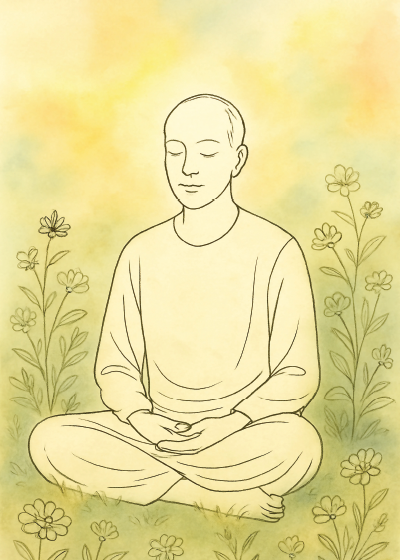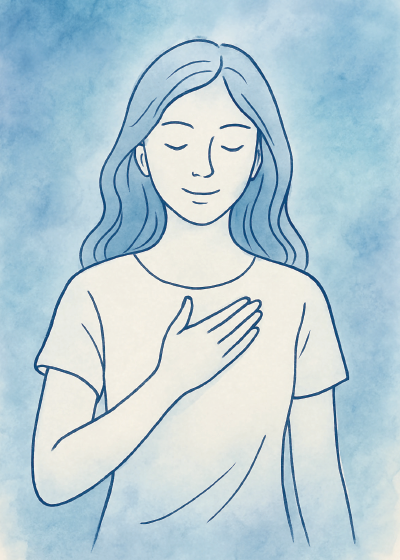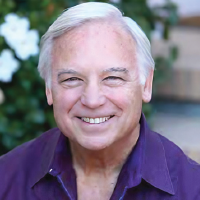PURNIMA RAMAKRISHNAN interviews JACK CANFIELD, the co-creator of Chicken Soup for the Soul. In part two of his interview, he shares insights on overcoming fear, following inner guidance, and the evolution of his definition of success over time. His wisdom offers practical advice and inspiration for pursuing one's passion and leading a fulfilling life.
Q: What stops us from achieving our dreams?
JC: Limiting beliefs—but also fear. Fear of loss, whether loss of reputation, loss of money, loss of credibility, loss of their job, loss of their relationship with their spouse, boyfriend, or girlfriend. Or, it can also be a fear of being physically hurt.
You’ve probably seen this: F-E-A-R means Fantasized Experiences Appearing Real. When the pandemic occurred, many people were afraid. We’re going to lose our jobs. We won’t be able to have clients. We can’t go out. I can’t go to school. I’m going to fall behind. And that was all just made up in their mind by looking ahead a year or two and thinking it’s all going to be worse.
I always ask people to do one of two things. Either come back to the present moment—“right now, everything’s fine”—or if you’re going to go into the future, imagine something positive happening. “I’m going to get my job.” “My book’s going to become a bestseller.”
The last thing I teach about fear is to feel the fear and do it anyway. Most people can dive off a diving board if they have ever learned to swim. Now, you didn’t get out on the end of the board, look at your mother or your father or your coach, and say, “I have a fear of jumping into liquids from high places. I’m going to go talk to a therapist to get rid of this fear, and when I come back, I’ll jump in the water.” No one ever did that. What did we do? We felt the fear, and we jumped anyway. And mostly we survived, right? And then, pretty soon, we’re jumping in and doing cannonballs and splashing everybody and having a good time because we felt the fear and we did it anyway.
If you’re going to go skydiving, if you’re going to go scuba diving, if you’re going to give your first speech or ask that person for a date, you’re probably going to feel a little fear. It’s natural. But if you go and do it, you survive. That’s what builds self-confidence. Self-confidence is the result of taking a risk and surviving.

One of the techniques I teach all my students now
is what we call “micro actions.”
Do something small to get started.
So, the first time you talk, you’re a little nervous, but then nothing bad happens. The next time you speak, maybe people will even applaud. And then the 20th time, they’re giving a standing ovation—only because you survived.
Every time you came back, came back, came back. And even if you failed think about this—even if you failed, you survived it!
To everybody reading this: you’ve survived everything that ever happened to you, or you wouldn’t be here. We are natural survivors. And if we can remember that we’ve had a lot of successes, we’ve had a lot of things where we’ve done well, and we’ve just got to keep on going out there.
Now, if you’re going to feel the fear and do it anyway, start small. In other words, don’t make your first audience a thousand people. Talk to ten people in a room. Practice your talk in the mirror. One of the techniques I teach all my students now is what we call “micro actions.” Do something small to get started.
I’ll share a quick story with you. There was a guy named Jim Bunch. He’s a teacher in America and runs the program called The Ultimate Game of Life. I was on the phone with him. He asked me, “What’s your goal, Jack?” I said, “Oh, I want to get fit. I want to lose weight.” He said, “Great, put the phone down and give me ten pushups.”
I said, “Jim, no, I’m talking about joining a gym and getting a coach.” He said, “Jack, put the phone down and give me ten pushups.”
I said, “Jim, you’re not listening.”
He said, “Jack, you’re not listening, and we’re not moving on. Give me ten pushups. So, I put the phone down, and I did ten pushups.”
He said, “Now, I’m teaching you an important lesson. As soon as you have a desire to do something new, start small. Make the phone call; make the appointment. It doesn’t have to be huge, but start now because we all can do something small. You don’t have to start with a twenty-mile run; start with walking around the block once.
And that was critical to me to get that. So, that’s what I would say too: you can feel the fear and do it anyway, but don’t start with something that’s so overwhelmingly scary that you freeze.
Q: Thank you so much, Jack. I like what Jim told you about actually putting the phone down and doing ten pushups. My next question is, how has this spiritual path shaped your life? I have noticed that all your books have spiritual undertones. And you have spoken so much about visualization, affirmations, and releasing the brakes. And there’s something deeply soulful in what you say, what you’ve written, and what you teach. I wonder how your inner journey has shaped the way you lead and serve people.
JC: My spiritual path started when I was about twenty-eight years old. I was living in Massachusetts. My ex-wife and I had a camper van. We drove down through Mexico to Guatemala, camping on the side of Lake Atitlán. We went through the clouds to get up there, and it was next to a volcano. I was reading Autobiography of a Yogi by Paramahansa Yogananda.
That was the first spiritual book I ever read.
I felt, “Oh my God, there’s so much more to life than I understood.” I was a psychologist, but I wasn’t spiritually awake at that time. I decided, “Well, I’m going to learn to meditate. I have to learn to do yoga.” So I bought a book on yoga and started doing it on my own. It was a little paperback. And then I took some meditation classes.
You can feel the fear and do it anyway,
but don’t start with something
that’s so overwhelmingly scary that you freeze.
I met a guy named Guru Shabad Singh. He was teaching meditation, and I would get into ecstatic states. I began to realize I wanted to teach that as well. So, I discovered this form of psychology called psychosynthesis. It was developed by an Italian psychologist named Roberto Assagioli. He was a contemporary of Carl Jung. He had this theory that we all have a Higher Self, our soul. He had this diagram, like an upside-down funnel. At the top is your Higher Self, and it comes down into this thing called your center of awareness, the eye.
So, when I meditate, I’m in that center, and I can choose to be aware of my Higher Self. But around that center of the eye, there’s a choice. I can choose to place my consciousness on my body. I can choose to place it on my emotions. I can choose to place it on the thoughts I’m thinking.
These are all psychological functions, but it was all in service of the Higher Self. The way he described it was that you have an orchestra director directing all these other instruments, which are your body and your emotions. From this place of “eye,” tune into your Higher Self, get the direction for your next step or what you need to be focusing on, and then use the function of your intellect and your body and your emotions to go and do the thing in the world that you’ve gotten this guidance about. That takes us out of the ego. So, it’s all about goal-setting and vision and taking action and using affirmations and visualization—but in the service of the Higher Self, in the service of the soul, if you will.
What am I here to do? What’s the guidance that I am getting?
That is the success principle, Inquire Within.
That generally is how everything unfolded for me.
That’s how it began to evolve for me. I could still teach all the stuff I’d learned from my original mentor, W. Clement Stone, who was a contemporary and friend of Napoleon Hill, who wrote Think and Grow Rich, which was a great book in terms of success. That spirituality gave me the context for everything else. Visualization can be used to create fear, or it can be used to create motivation for achieving your goal.
So, tap in: What’s my goal? What am I being asked to do? What thoughts do I need to think to do that? That’s my affirmations, my inner self-talk. How do I use my body? What actions do I take? How do I respond to feedback? Because not all actions work. And it all went into the book, Success Principles. All of this must be in service of my purpose: What am I here to do? What’s the guidance that I am getting? That is the success principle, Inquire Within. That generally is how everything unfolded for me.
Q: Coming back to another of my favorites, the Chicken Soup for the Soul series. Tell me how it all came to be?
JC: First of all, the stories are so resonant with people because they are about universal themes that everybody deals with—relationships, love, death, grief, overcoming obstacles, pursuing dreams, all the things that make up the essence of what we think about, and focus on what we want to achieve in our lives. We all want to be loved and loving. There are sections on love, self-esteem, honoring, and loving ourselves. It relates to things that everybody can connect with. My consciousness was pretty elevated at that time, and all the stories were filtered through me and Mark, my co-author, who was also a meditator and someone who spent time in India studying. For us to like a story and approve it, it has to have a level of vibration, in terms of love and joy, and the truth of life.
Let me share two things with you that most people do not know. First of all, how did the title come to me? So, we did not have a title. We had the book. We were supposed to go to New York and meet some publishers and sell them the book. Mark and I decided that we would meditate for a week and ask for a title. Mark was much more hyperactive than I am, and he would go to bed and meditate, “best-selling title, best-selling title, best-selling title…” I am a bit more mellow, and every morning I would wake up and just submit, “God, give me a title,” and I would sit in silence and wait.
Nothing happened on the first day. Nothing happened on the second day. I woke up early on the third day. A big green chalkboard, like in school, appeared. And a hand came out and wrote “Chicken Soup” on it. And I thought, “Wow,” as I thought it was God’s hands. Then I thought, “What does chicken soup have to do with this book?” Again, I sat in meditation. This voice said, “When you were sick as a child, your grandmother gave you chicken soup.” Then I said, “This is not a book about sick people.” And then the voice said, “People’s spirits are sick. They are living in resignation, hopelessness, and fear. And these stories that you have will help them overcome that.” And I thought, “Chicken Soup for the Spirit.” That did not sound right. Then I said to myself, “Chicken Soup for the Soul?” And I got goosebumps. I told my wife. She got goosebumps. I called Mark. He got goosebumps. I told our agent. He got goosebumps.
Then, we went to New York and met with twenty-one publishers. Seven a day for three days. Nobody got goosebumps. We got twenty-one rejections. Nobody liked it. “Stupid title.” “People don’t read stories.” “It’s nicey-nice.” “It’s too positive.” So, 144 rejections later, our agent gave us the book back and said, “I can’t sell it. I tried. Nobody wants it.”
I was living in Los Angeles at that time. Someone said that in Orange County, at the Disneyland Convention Center, there will be a convention of publishers. So, Mark and I went down with our backpacks, and had about twenty stories from the book, and we went around and talked to all these publishers, and they kept saying, “No!” “No!” “No!” “No!”
Eventually, the 145th person we talked to said, “I will read it.” Nobody else even wanted to read it. He takes it home and calls me back a week later, and he said, “I love it, but I don’t know how many copies we could sell. I am a little bit reluctant. If you can convince me that we can sell 20,000 copies, I will publish it.” So, every time Mark and I went out to give a talk, we had this sheet of paper that said, “I promise to buy X number of copies of Chicken Soup for the Soul.” We received promises to buy 20,000. Some people said they would buy five or ten. One guy said he would buy a 1,000. So, we went to the publisher and said, “Here we have 20,000 promises.” That is how the title came to be. That is how the stories were published.

Q: Thank you for telling me that story. I also wanted to ask you about the book Success Principles.
JC: Let me tell you the question I get asked a lot about that book. People ask me which is the most important success principle, and I tell them that if you could only keep one organ in your body, which one would you keep? Because without the heart, without the lungs, without the liver, or the kidneys, nothing would work. So if you look at that book, there is a lot about taking responsibility, having a goal, making sure it is measurable, using affirmations, using visualizations, taking action, taking feedback, persevering, having a team, having an accountability group—there is a lot of stuff in there. It really is a system of success. It is like a recipe.
So, the final thing for everybody reading this is this: You have everything you need to do anything you want. You would not be allowed to have a desire if you did not have the capacity to fulfill it. You will not come up with a goal if you do not have the ability to reach it. Now, you may have to learn some new things or get a credential that you don’t have. You may need to attend school and obtain a degree or license. You may have to team up with other people. It might take you a long time to get there. But you will literally be unable to have that dream without the ability to make it happen. And I could tell you story after story of people doing things. You give me a problem or challenge, and I can tell you a story about someone who faced the exact same problem and still achieved it. It is not about your circumstances. It is not about your physicality. It is about your intention, your belief, your heart, and your perseverance.
So, trust yourself, follow your heart, and know that you have the capacity to make your dreams come true.

Trust yourself, follow your heart,
and know that you have the
capacity to make your dreams come true.
AI generated images

JACK CANFIELD
Jack Canfield is a bestselling author, professional speaker, trainer, and entrepreneur. He is the founder and CEO of the Canfield Training Group and coauthor of more than two hundred books, including the Chicken Soup for the Soul®... Read More

